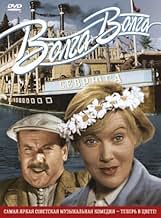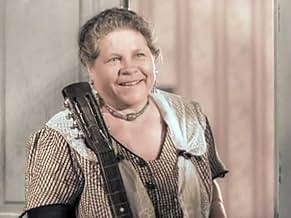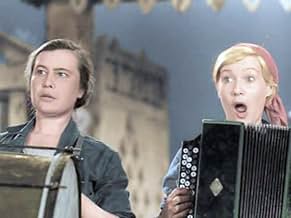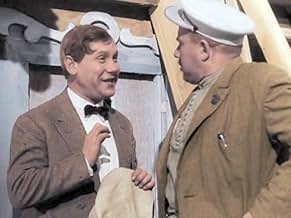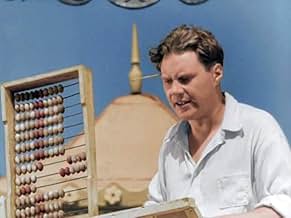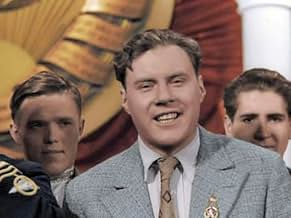Ajouter une intrigue dans votre langueWidely claimed to be Joseph Stalin's favorite movie, this classic musical comedy is a must-see. The action takes place on a steamboat on the iconic Volga River, as two groups of performers t... Tout lireWidely claimed to be Joseph Stalin's favorite movie, this classic musical comedy is a must-see. The action takes place on a steamboat on the iconic Volga River, as two groups of performers travel to Moscow to perform in the Moscow Musical Olympiad.Widely claimed to be Joseph Stalin's favorite movie, this classic musical comedy is a must-see. The action takes place on a steamboat on the iconic Volga River, as two groups of performers travel to Moscow to perform in the Moscow Musical Olympiad.
- Prix
- 1 victoire au total
Anatoli Shalayev
- The Boy Musical Prodigy
- (as Tolya Shalayev)
Mariya Mironova
- The Secretary
- (as M. V. Mironova)
Nikita Kondratyev
- The Waiter
- (as N. S. Kondratyev)
Vsevolod Sanaev
- The Lumberjack
- (as V. V. Sanayev)
Alexei Dolinin
- The Militia Man
- (as A. G. Dolinin)
Ivan Chuvelyov
- The Olympiad Representative
- (as I. P. Chuvelyov)
Nikolai Khryashchikov
- Appearing
- (uncredited)
Yakov Rykov
- Tugboat captain
- (uncredited)
Lidiya Vinogradova
- Amateur Performer
- (uncredited)
Avis en vedette
The insane tempo of the film made me think that I had been sitting at least 3 enjoyable hours before my TV. I use "enjoyable" in its direct sense. As a musical comedy the film is superb and can put to shame any today's production of "Stariye pesni o glavnom" calibre.
The ideology, though present, is not showing off. What the film is really showing off is talents. The talents come in battalions.
The famous chase scene, when all the dancing, playing, and singing villagers are after Byvalov, is unforgettable. I also enjoyed the race of the ships presented in a panorama view. The number of catchy phrases is also to be mentioned (we hear them now and then in our reality - this is where they come from): "Allio, garazh!", "Kantseliarskaya krysa!", "Bez vodi...", etc.
The wise use of music, the numerous gags and stunts, the powerful characters with great voice talents, etc. make this film a gem of our black-and-white era.
There is fire in their eyes and there is atomic energy in their moves while their voices are piercing quicksilver bolts.
Today to shoot such an energetic film is simply impossible. People are too lost, too sick, and too weak. Too bad the Soviet times were also out of joint. The latter adds some bitter taste to the production, which has all the rights to be called the best comedy/musical of all time.
If I am in mood for rich national energetic heavy-duty entertainment with an artistic touch, this is a perfect example to inject into my DVD player and load onto myself. The beginning and the ending of the movie are both unique (and no portrait of Stalin and demonstrations - thanks a lot!).
Mrs Lyubov Orlova is again different and again excellent.
All in all it is definitely 10 out of 10: it entertains and makes it in a most artistic and favourable way. Thank you for attention.
The ideology, though present, is not showing off. What the film is really showing off is talents. The talents come in battalions.
The famous chase scene, when all the dancing, playing, and singing villagers are after Byvalov, is unforgettable. I also enjoyed the race of the ships presented in a panorama view. The number of catchy phrases is also to be mentioned (we hear them now and then in our reality - this is where they come from): "Allio, garazh!", "Kantseliarskaya krysa!", "Bez vodi...", etc.
The wise use of music, the numerous gags and stunts, the powerful characters with great voice talents, etc. make this film a gem of our black-and-white era.
There is fire in their eyes and there is atomic energy in their moves while their voices are piercing quicksilver bolts.
Today to shoot such an energetic film is simply impossible. People are too lost, too sick, and too weak. Too bad the Soviet times were also out of joint. The latter adds some bitter taste to the production, which has all the rights to be called the best comedy/musical of all time.
If I am in mood for rich national energetic heavy-duty entertainment with an artistic touch, this is a perfect example to inject into my DVD player and load onto myself. The beginning and the ending of the movie are both unique (and no portrait of Stalin and demonstrations - thanks a lot!).
Mrs Lyubov Orlova is again different and again excellent.
All in all it is definitely 10 out of 10: it entertains and makes it in a most artistic and favourable way. Thank you for attention.
As most of its (all too few) viewers know, »Volga Volga« was supposed to be the Soviet counterpart to Hollywood musical comedies of the time. It is also well-known it was Stalin's favourite movie... So what? Wagner was Hitler's favourite composer does that make him a bad composer? Hitler also loved Greta Garbo, Charlie Chaplin, Marlene Dietrich... does that make them trash?
However, I *do* find it fascinating that Stalin loved this film. I find it even more fascinating that the film was released for the general public to see, and that its director wasn't sent to Siberia.
Yes, it has propaganda written all over it in the same fashion as the contemporary »Yankee Doodle Dandy« has, to mention just one famous non-Soviet example. But what makes this film such a wonderful comedy is the intelligent at times spine-chilling humour of the dialogues. However, only viewers who are familiar with the Soviet political (and general) culture of the time will appreciate them or even notice them. If one doesn't know that the young man is reciting a very famous poem by Lermontov when trying to impress the semi-illiterate political chieftain, it will be very difficult to appreciate the latter's bewildered expression and his reply: »Oh, begone with your self-critique, save it for the next political meeting« (I am quoting from memory, based on the original, not on the English translation, which I am not familiar with). Indeed, one has to know what »self-critique« meant... If you do, you'll find it a cracking-funny dialogue. The same goes for many, many other scenes like the one when the ship's cook introduces (and re-introduces) himself to the ignorant political chief, starting merrily as a »chef« and ending up as a »food-processing worker«. And then some scenes are sheer poetry: like the one when the entire village is chanting the contents of a telegram from the river bank, so that the eager recipient of the telegram already embarked on a ship - will hear it..:)
The ideology behind it is clear: only the peasants sorry, »land workers« - are healthy and wise. The only jerk in the film is the hilariously ignorant and self-important representative of the political »authorities«. This, I suppose (besides the wonderful humour and the cheerful music), is what made this film so popular with the »masses«. And this must be also the reason why the film was released. (In 1938, no less when political »purging« was at its worst.)
There are however, certain scenes in the film that make me wonder how on earth it made it past the censors. (Due to Stalin's personal intervention, no doubt?) The oddest example comes towards the end of the film, when the political chieftain is asked by the port authorities whether he is the author of the (title) song »Volga Volga«. Panicking, he not only blames someone else (»Shulbert«, Franz Schubert to you and me) regardless of the fact that »Shulbert« most definitely did NOT »do« it - but he starts screaming: »I confess nothing, I confess nothing!«, even though nobody had asked him to confess anything... Only those who know what »confession« implied can find his mindless reaction hilarious and spine-chilling.
It is said that Stalin had a copy of this film delivered to the USA authorities. They were so baffled by it that they searched it for hidden messages. If this is true, it just goes to show how little they understood and knew about each other.
Or is there a hidden message...? :)
However, I *do* find it fascinating that Stalin loved this film. I find it even more fascinating that the film was released for the general public to see, and that its director wasn't sent to Siberia.
Yes, it has propaganda written all over it in the same fashion as the contemporary »Yankee Doodle Dandy« has, to mention just one famous non-Soviet example. But what makes this film such a wonderful comedy is the intelligent at times spine-chilling humour of the dialogues. However, only viewers who are familiar with the Soviet political (and general) culture of the time will appreciate them or even notice them. If one doesn't know that the young man is reciting a very famous poem by Lermontov when trying to impress the semi-illiterate political chieftain, it will be very difficult to appreciate the latter's bewildered expression and his reply: »Oh, begone with your self-critique, save it for the next political meeting« (I am quoting from memory, based on the original, not on the English translation, which I am not familiar with). Indeed, one has to know what »self-critique« meant... If you do, you'll find it a cracking-funny dialogue. The same goes for many, many other scenes like the one when the ship's cook introduces (and re-introduces) himself to the ignorant political chief, starting merrily as a »chef« and ending up as a »food-processing worker«. And then some scenes are sheer poetry: like the one when the entire village is chanting the contents of a telegram from the river bank, so that the eager recipient of the telegram already embarked on a ship - will hear it..:)
The ideology behind it is clear: only the peasants sorry, »land workers« - are healthy and wise. The only jerk in the film is the hilariously ignorant and self-important representative of the political »authorities«. This, I suppose (besides the wonderful humour and the cheerful music), is what made this film so popular with the »masses«. And this must be also the reason why the film was released. (In 1938, no less when political »purging« was at its worst.)
There are however, certain scenes in the film that make me wonder how on earth it made it past the censors. (Due to Stalin's personal intervention, no doubt?) The oddest example comes towards the end of the film, when the political chieftain is asked by the port authorities whether he is the author of the (title) song »Volga Volga«. Panicking, he not only blames someone else (»Shulbert«, Franz Schubert to you and me) regardless of the fact that »Shulbert« most definitely did NOT »do« it - but he starts screaming: »I confess nothing, I confess nothing!«, even though nobody had asked him to confess anything... Only those who know what »confession« implied can find his mindless reaction hilarious and spine-chilling.
It is said that Stalin had a copy of this film delivered to the USA authorities. They were so baffled by it that they searched it for hidden messages. If this is true, it just goes to show how little they understood and knew about each other.
Or is there a hidden message...? :)
A musical comedy. The famous work of the famous director Grigory Alexandrov and the actress Lyubov Orlova, beloved by millions at that time, as well as Comrade Stalin's favorite film, which he often reviewed. And how could you pass by such a thing? So the author of this review could not do this, and looked at the picture with great pleasure. And the final result rather pleased him. And here is a brief opinion - A good Soviet musical comedy of the late thirties. There were almost only advantages in it (with the exception of editing, but the author of this review will tell you about this in a separate paragraph), but for now you should finish the introduction and move on to the interesting.
So, here are the pros: 1. The scenario - the picture tells the story of two amateur musical groups that go to Moscow to participate in the Olympics, and the leaders of these groups: Avdotya Petrova, nicknamed "Strelka" and Alexey Trubyshkin are lovers, which gives everything that is happening a whisper of piquancy. At the same time, the local bureaucrat Byvalov takes part in all this activity, who wants to "push himself" at the expense of talented people. The old pilot fits well into this company. There are many different situations waiting for them on the way, and in the final there will be a grand triumph. In addition, the creators even destroy the "fourth wall", which looks pretty good. In addition to the fact that the script here is easy, it also charges every viewer who looks at the picture with a great mood. It's worth a lot.
2. Humor - there are frankly funny moments, and a lot of funny situations, and outright antics of some actors (in most cases it works correctly). Of course, wild laughter is not worth hoping for, although there is one point that strongly leads to this. The humor here is more mundane, and that's what catches on.
3. Songs and music - this picture can now be called a musical with full rights, since they sing and dance quite often here - and it turned out just great. The precision of the movements, and this despite the fact that some of the artists were already far from young. And the songs are pleasing to the eye and ear. Although there is not a single one that sticks in the memory (except classical music, which everyone knows). Although their text was written by Vasily Lebedev-Kumach.
4. The life of the USSR in the thirties - we will be shown the Volga-Don Canal, which was one of the great buildings of communism, musical competitions, and not only. They will show us how life itself is changing, how the achievements of the Soviet government made the dreams of ordinary people a reality. And although the scenario line with Byvalov is reduced to humor, it reflects reality (which is still relevant).
Now it should be said about an important point that somewhat spoils the overall impression, namely the crooked installation, and the author of this review watched the color version of the painting, which was castrated in the fifties of the last century, and the original of 1938 has not been preserved (thank you tell the Cornhusker for this), so we cannot enjoy the original version. And it's lucky that they didn't paint the fully castrated version, because there is a black-and-white version from 1961, from where all mentions of Stalin, his images and busts were cut out. The installation was done very poorly and the glues are visible (this is written by a person who has been engaged in installation for a long time).
Separately, the author of this review wants to thank the artists Igor Ilyisky (bureaucrat Byvalov), Lyubov Orlova, Andrei Tutyshkin, Vladimir Volodin (old pilot), and all the others for the talented performance of their roles in this musical comedy. Now their acting will seem too "pompous" to many, but they tried anyway, and it's not for nothing that the picture has gained well-deserved popularity, and it's not for nothing that it has gained cult status in the country. You need to know the classics!
A score of 8 out of 10 and a recommendation to watch!
So, here are the pros: 1. The scenario - the picture tells the story of two amateur musical groups that go to Moscow to participate in the Olympics, and the leaders of these groups: Avdotya Petrova, nicknamed "Strelka" and Alexey Trubyshkin are lovers, which gives everything that is happening a whisper of piquancy. At the same time, the local bureaucrat Byvalov takes part in all this activity, who wants to "push himself" at the expense of talented people. The old pilot fits well into this company. There are many different situations waiting for them on the way, and in the final there will be a grand triumph. In addition, the creators even destroy the "fourth wall", which looks pretty good. In addition to the fact that the script here is easy, it also charges every viewer who looks at the picture with a great mood. It's worth a lot.
2. Humor - there are frankly funny moments, and a lot of funny situations, and outright antics of some actors (in most cases it works correctly). Of course, wild laughter is not worth hoping for, although there is one point that strongly leads to this. The humor here is more mundane, and that's what catches on.
3. Songs and music - this picture can now be called a musical with full rights, since they sing and dance quite often here - and it turned out just great. The precision of the movements, and this despite the fact that some of the artists were already far from young. And the songs are pleasing to the eye and ear. Although there is not a single one that sticks in the memory (except classical music, which everyone knows). Although their text was written by Vasily Lebedev-Kumach.
4. The life of the USSR in the thirties - we will be shown the Volga-Don Canal, which was one of the great buildings of communism, musical competitions, and not only. They will show us how life itself is changing, how the achievements of the Soviet government made the dreams of ordinary people a reality. And although the scenario line with Byvalov is reduced to humor, it reflects reality (which is still relevant).
Now it should be said about an important point that somewhat spoils the overall impression, namely the crooked installation, and the author of this review watched the color version of the painting, which was castrated in the fifties of the last century, and the original of 1938 has not been preserved (thank you tell the Cornhusker for this), so we cannot enjoy the original version. And it's lucky that they didn't paint the fully castrated version, because there is a black-and-white version from 1961, from where all mentions of Stalin, his images and busts were cut out. The installation was done very poorly and the glues are visible (this is written by a person who has been engaged in installation for a long time).
Separately, the author of this review wants to thank the artists Igor Ilyisky (bureaucrat Byvalov), Lyubov Orlova, Andrei Tutyshkin, Vladimir Volodin (old pilot), and all the others for the talented performance of their roles in this musical comedy. Now their acting will seem too "pompous" to many, but they tried anyway, and it's not for nothing that the picture has gained well-deserved popularity, and it's not for nothing that it has gained cult status in the country. You need to know the classics!
A score of 8 out of 10 and a recommendation to watch!
This 1938 musical comedy from the Soviet Union directed by Grigori Alexandrov has some fame as Stalin's favorite movie. He liked it so much he has it shown in his private screening room at the Kremlin to his Politburo colleagues scores of time. He repeatedly teased Khrushchev for his likeness to Byvalov, the humorless village bureaucrat played by Igor Ilinsky.
The movie opens with an amusing intro in which a catchy song mentions the main cast and the characters they play. Then it moves to a scene showing the two love interests of the film kissing in the mouth (the kiss is far more passionate than what most movies from the West would permit at the time). And then we go to the main story. In a country village along the Volga River, there is a friendly competition between a folk music band (led by the beautiful Lyubov Orlova) and a more conventional classical music outfit, which is led by her boyfriend, Alyosha (played by Andrei Tutyshkin). When in the village they heard there is a musical contest for country bands in Moscow, and despite the initial opposition of the bureaucrat, both bands take the river boat to reach the capital.
Naturally for a musical comedy, the finest thing in the film is the musical numbers. The best in my opinion comes around the middle when virtually all the village gets into playing different tunes to convince the bureaucrat that they have talent worthy of going to the contest in Moscow. The movie oozes nostalgia for the simple village life (in a time when the Soviet Union was rapidly urbanizing) and is also how the Soviet government has made life so much better than now villagers mostly has to worry not about surviving but about playing in music contests. Only towards the end the movie falls into the territory of heavy propaganda. The sympathy of Orlova helps (though sometimes she stretches it too far).
The movie opens with an amusing intro in which a catchy song mentions the main cast and the characters they play. Then it moves to a scene showing the two love interests of the film kissing in the mouth (the kiss is far more passionate than what most movies from the West would permit at the time). And then we go to the main story. In a country village along the Volga River, there is a friendly competition between a folk music band (led by the beautiful Lyubov Orlova) and a more conventional classical music outfit, which is led by her boyfriend, Alyosha (played by Andrei Tutyshkin). When in the village they heard there is a musical contest for country bands in Moscow, and despite the initial opposition of the bureaucrat, both bands take the river boat to reach the capital.
Naturally for a musical comedy, the finest thing in the film is the musical numbers. The best in my opinion comes around the middle when virtually all the village gets into playing different tunes to convince the bureaucrat that they have talent worthy of going to the contest in Moscow. The movie oozes nostalgia for the simple village life (in a time when the Soviet Union was rapidly urbanizing) and is also how the Soviet government has made life so much better than now villagers mostly has to worry not about surviving but about playing in music contests. Only towards the end the movie falls into the territory of heavy propaganda. The sympathy of Orlova helps (though sometimes she stretches it too far).
Even those of us with some sort of education in the field of cinema rarely get to see other Soviet films than those of Eisenstein, Tarkovskij and maybe Pudovkin. It´s easy for every western film fan to become as prejudiced as the bureaucrat Byvalov in Volga-Volga: "Talent? in this dump?" My point being, of course, that it would be unfair to world cinema as well as to oneself if one were to deny oneself the pleasures of at least once in a while seeing a Feuillade serial, a German mountain film or a Soviet musical. Volga-Volga is an excellent choice for the curious cinephile. As everyone points out, it has the distinction of reportedly being Stalin´s favourite film, it has stars in it is well as great music, I could go on and on. The main reason for seeing Volga-Volga is of course that it´s great fun. It had me in stitches more than once.
A comment on polart´s vhs edition of Volga-Volga: Granted, the subtitles are yellow and eminently readable, but they are also quite often badly timed and frequently seem insufficient. Also, the framing seems to be slightly off, something i´m hesitant in blaming comrades Alexandrov and Petrov for.
A comment on polart´s vhs edition of Volga-Volga: Granted, the subtitles are yellow and eminently readable, but they are also quite often badly timed and frequently seem insufficient. Also, the framing seems to be slightly off, something i´m hesitant in blaming comrades Alexandrov and Petrov for.
Le saviez-vous
- AnecdotesFamously, this was Joseph Stalin's favorite film and he would often show off how well he knew it by performing every part just before the actors on screen.
- ConnexionsFeatured in Komediya davno minuvshikh dney (1980)
Meilleurs choix
Connectez-vous pour évaluer et surveiller les recommandations personnalisées
Détails
- Durée1 heure 44 minutes
- Couleur
- Mixage
- Rapport de forme
- 1.37 : 1
Contribuer à cette page
Suggérer une modification ou ajouter du contenu manquant


